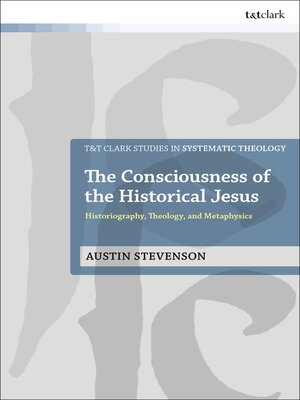The Consciousness of the Historical Jesus
ebook ∣ Historiography, Theology, and Metaphysics · T&T Clark Studies in Systematic Theology
By Austin Stevenson

Sign up to save your library
With an OverDrive account, you can save your favorite libraries for at-a-glance information about availability. Find out more about OverDrive accounts.
Find this title in Libby, the library reading app by OverDrive.



Search for a digital library with this title
Title found at these libraries:
| Library Name | Distance |
|---|---|
| Loading... |
In this book, Austin Stevenson argues that it is not the 'divinity' of Jesus that causes problems for historians, but his humanity. To insist that Jesus was fully human, as both theologians and historians do, still leaves us with the question of what it means to be human. It turns out that theologians and historians often have different answers to this question on both a philosophical and a theological register.
Furthermore, historians frequently misunderstand the historiographical implications of classical Christology, and thus the compatibility between traditional beliefs about Jesus and critical historical inquiry. Through close engagement with the thought of Thomas Aquinas (c. 1225–74), this book offers a new path toward the reconciliation of these disciplines by focusing on human knowledge and subjectivity, which are central issues in both historical method and Christology. By interrogating and challenging the normative metaphysical assumptions operative in Jesus scholarship, a range of possibility is opened up for approaches to Jesus that are genuinely historical, but not naturalistic.
Furthermore, historians frequently misunderstand the historiographical implications of classical Christology, and thus the compatibility between traditional beliefs about Jesus and critical historical inquiry. Through close engagement with the thought of Thomas Aquinas (c. 1225–74), this book offers a new path toward the reconciliation of these disciplines by focusing on human knowledge and subjectivity, which are central issues in both historical method and Christology. By interrogating and challenging the normative metaphysical assumptions operative in Jesus scholarship, a range of possibility is opened up for approaches to Jesus that are genuinely historical, but not naturalistic.







